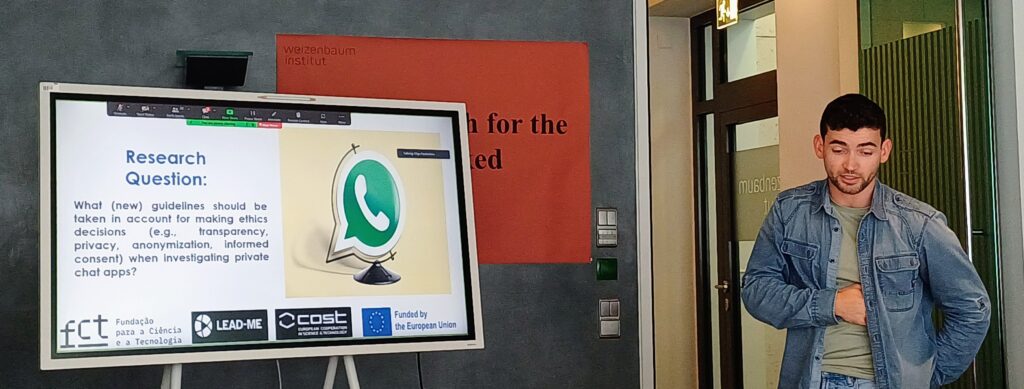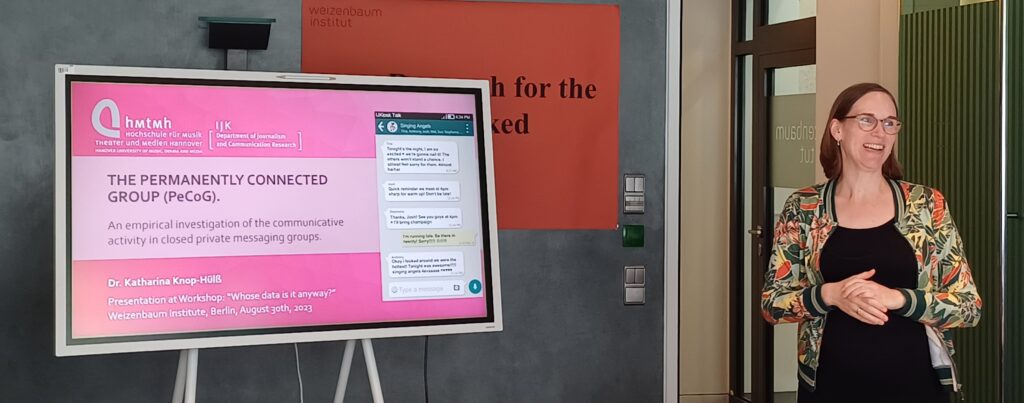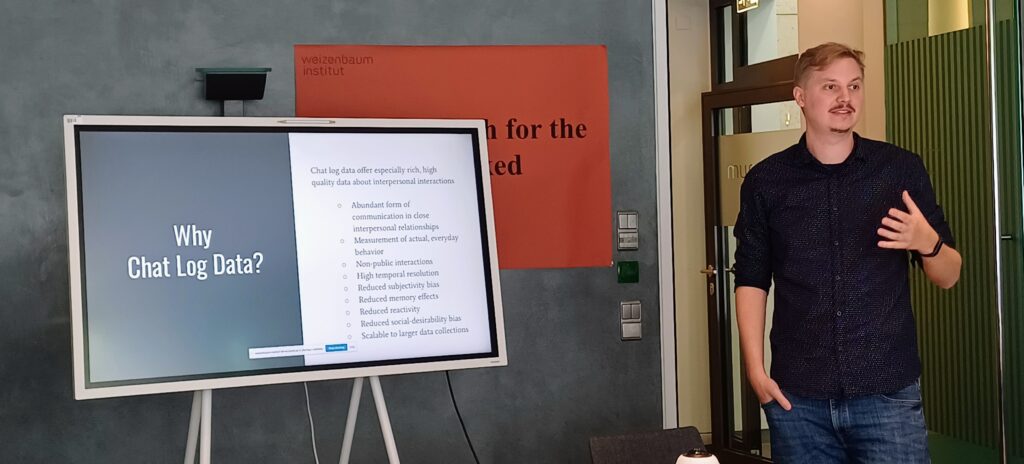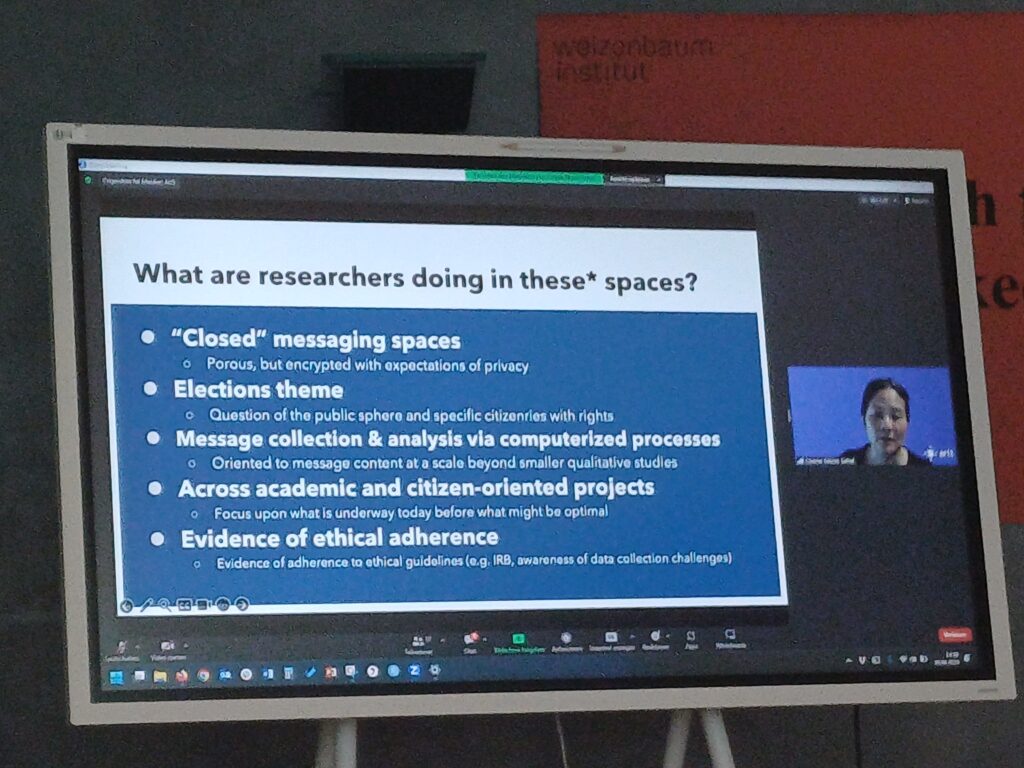On August 30th, 2023, the Methods Lab and Olga Pasitselska (U of Groningen) organized the workshop on data donation in messaging groups research. The workshop intended to tackle practical and ethical issues behind data collection, processing, and dissemination in the research of closed messaging groups. We asked four colleagues to share their experiences and struggles and provide their solutions for closed chat groups research. The invited speakers, Sérgio Barbosa (U Coimbra), Katharina Knop-Hülß (HMTMH Hannover), Connie Moon Sehat (Hacks/Hackers), and Julian Kohne (GESIS), paved the way for better conceptualization of messaging groups and application of tailor-made ethical and practical solutions. The workshop allowed for a cross-field discussion of ad-hoc developments in closed groups research and provided many insights for the audience, speakers, and organizers.
Sérgio Barbosa explained his approach of joining activist WhatsApp groups in Brazil. Sérgio suggested that informed consent cannot be assumed as a one-off solution: instead, one should go beyond the check-list of ethical guidelines and learn by doing and negotiating with the group members. When joining these types of groups, researchers should clearly state the purposes of the research and disclose their identity, and also share the outcome of the research and promote it in the local community as well. Different approaches should be taken, depending on the type of groups: for example, pro-democracy groups and extremist groups should be treated differently, independent of the group size.

Dr. Katharina Knop-Hülß shared insights about studying non-professional secondary groups (e.g., choir, sport, volunteer groups) with her highly unobtrusive and highly invasive research approach of scraping chats’ content. Since these groups were representative of intimate environments of everyday communication, they can be considered as “safe spaces”, closed from the public eye. To account for the sensitive nature of the data collection, Katharina used an opt-in approach, provided pseudonymized chat logs to the participants before they consented to participate, and complied with the requirement not to share this data with anyone beyond the research team, even after the data was pseudonymized.

Julian Kohne introduced his digital platform for WhatsApp data donation that automatically cleans and anonymizes the data, reducing researchers’ exposure to and intervention in the raw data. In his research, Julian takes a participant-centered approach: the data collection tool is designed to maximize usability and control of the data for research participants. They can pre-process the data in a way that allows them to review the chat logs and decide what exactly they want to donate, deleting undesirable pieces of data, up to the possibility of deleting time stamps and other meta-data. With that, the tool also allows researchers to track how much and what types of data was deleted.

Dr. Connie Moon Sehat presented the meta-review of closed messaging apps research that aimed to determine what are the conditions in terms of indexed invites, group size, discussion topics, or other aspects of closed groups that make them arguably public or private. Adding to the previous speakers’ examples of their research with activist/public and hobby and friends/private types of groups, the review summarized the discussed points and provided a framework for mapping chat groups according to the multiple parameters. Whether researchers scraped the groups without entering them, entered with invitation, disclosed or not their identity and research interest, depended on the nature of the groups and public interest that can justify researchers’ intervention into the closed communication spaces. Connie also stressed the possible differences in perceptions of groups’ “publicness” between users, researchers, and platforms, that also should be taken into account.

After four presentations, we continued the discussion with the online and offline audience, addressing the issues of generalizability of messaging data (what slice of the “natural” social interaction are we looking at here?), the role of language, and the differences between long- and short-term groups. We also discussed what is the role of the researcher in the automated versus manual data collection process, and how participants can benefit from data donation.
The workshop provided theoretical and practical insights for messaging groups research and outlined future directions for collaboration in creating the guidelines for ethical closed messaging research and data donation.